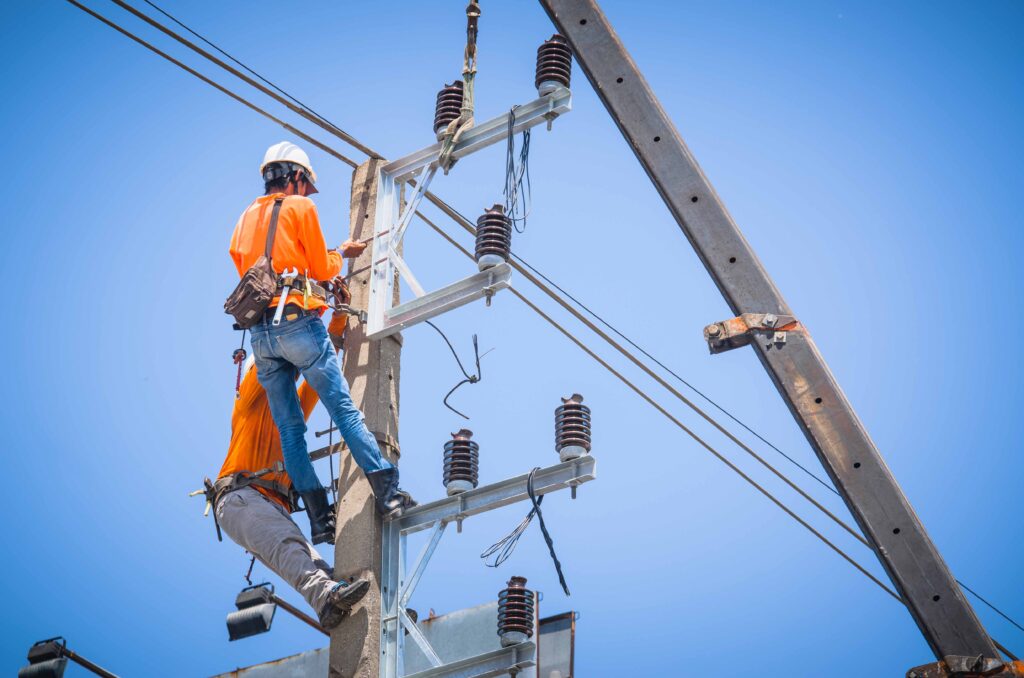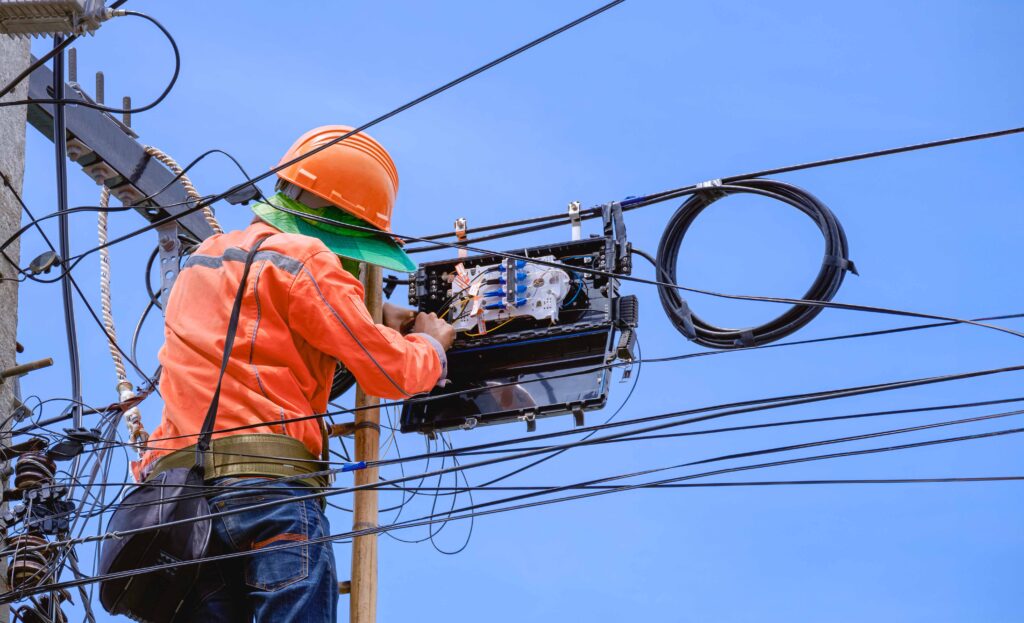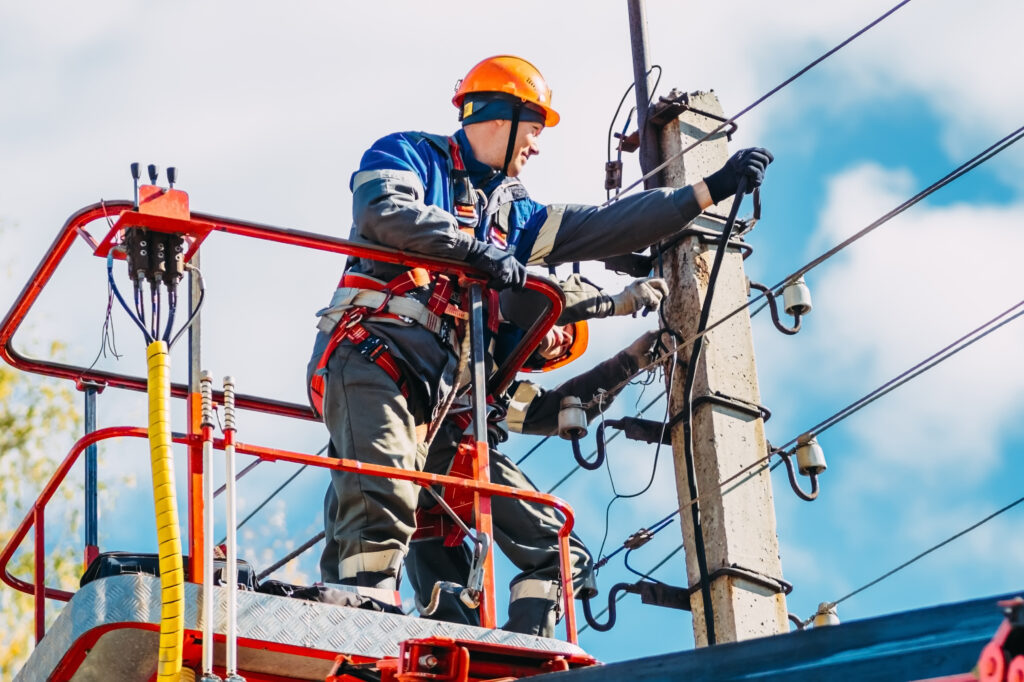The starting salary for an electrical lineman can range from $36,000 to $66,000. Factors like location, experience, and certifications influence this pay scale.
Electrical linemen are the skilled professionals responsible for installing, maintaining, and repairing electric power systems and telecommunications cables. They work in various environments, often at great heights and in challenging weather conditions, ensuring the reliability and safety of electrical infrastructure.
Being an electrical lineman requires technical knowledge, physical endurance, and attention to safety protocols. Job prospects in this field are favorable due to the ongoing need for electricity and communication services. Aspiring linemen typically undergo vocational training or an apprenticeship program, which greatly enhances employability and potential earnings. Despite the risks associated with the job, the role of an electrical lineman is critical, providing a stable career with competitive wages that increase with experience and expertise.
The Current State Of Electrical Lineman Salaries
The electrical lineman profession plays a crucial role in keeping cities powered and connected. A focus on their compensations reveals trends and standards that many aspiring linemen wish to understand before embarking on this electrifying career path.
Regional Variances In Pay
Electrical linemen salaries can differ widely based on location. Towns with a high demand for skilled workers often offer salaries above the national average. Conversely, areas with a lower cost of living might not match such pay rates.
| Region | Average Salary |
|---|---|
| West Coast | $70,000 |
| Midwest | $60,000 |
| South | $55,000 |
| Northeast | $65,000 |
Factors like local demand and state regulations also play a role in shaping salaries. Employers may offer higher wages to attract talent to remote or demanding locations.
Entry-level Positions Versus Experienced Linemen
Experience significantly influences an electrical lineman’s pay. Entry-level positions usually start lower on the salary scale, but with dedication and skill mastery, individuals can climb the pay ladder quickly.
- Entry-Level Linemen: Expect starting salaries around $35,000 to $50,000 annually.
- Mid-Level Linemen: With some years of experience, salaries can jump to the range of $50,000 to $65,000.
- Senior Linemen: Veterans in the field can command salaries upward of $65,000, possibly breaching into six figures based on tenure and expertise.
Professional development and certifications enable linemen to negotiate better salaries. Always, a lineman’s ability to work in diverse and challenging environments contributes to their earning potential.
Factors Affecting Lineman Earnings
When thinking about the starting salary for an electrical lineman, it’s more than just a number. It’s essential to consider various aspects that play a part in shaping this figure. Let’s explore the factors that can sway lineman earnings. From the level of education they have reached to the unions that represent them, each element has its weight.
Qualifications And Education
Education and skills are prime factors influencing lineman earnings. To kick-start a career, certain qualifications are a must. Here’s how these elements can affect pay:
- High School Diploma or GED is the basic requirement.
- Technical programs may offer a competitive edge.
- Apprenticeships provide hands-on training and potential for higher starting wages.
- Certifications like OSHA safety certifications can lead to better pay.
The Role Of Unions And Collective Bargaining
Unions have a strong impact on a lineman’s starting salary. They negotiate wages and benefits on behalf of their members. Here’s a quick breakdown:
- Unions work to secure fair pay and safe working conditions.
- Collective bargaining may result in higher industry standards for lineman wages.
- Union membership could mean more consistent pay raises and better job security.
Realities Behind The Starting Salary
The realities behind the starting salary for an electrical lineman might surprise you. It often goes beyond the base figure that appears on the job offer. Various factors affect take-home pay.
Standard Pay Packages For Newcomers
Electrical lineman positions typically start with a competitive salary. This career often includes benefits such as:
- Health insurance
- Retirement plans
- Education incentives
The base salary can be influenced by factors like location and company size. The following table showcases example starting salaries:
| Location | Small Company | Large Company |
|---|---|---|
| Urban Area | $30,000 | $35,000 |
| Rural Area | $28,000 | $32,000 |
Overtime And Hazard Pay Impact
Overtime can significantly boost an electrical lineman’s earnings. Power emergencies don’t stick to a 9-to-5 schedule. Linemen often work extra hours during:
- Storms
- Blackouts
- Emergency repairs
In addition to overtime, hazard pay recognizes the risks involved in this line of work. Climbing poles and handling live wires are dangerous tasks, and the added compensation reflects this.
Breaking Down The Wage Scale
Are you curious about what electrical linemen make when they start? Understanding this wage scale is vital. We reveal key factors that shape paychecks in this field. Let’s shed some light on their earning potential from the get-go.
Base Salary Insights
Base pay is a lineman’s core income before extras. It changes based on location, experience, and education.
| Experience Level | Typical Salary Range |
|---|---|
| Entry-Level | $35,000 – $50,000 |
| Middle-Level | $50,000 – $65,000 |
| Experienced | $65,000+ |
Additional Benefits And Perks
Electrical linemen enjoy more than base salary. They get benefits that boost their total earnings.
- Health Care: Covers medical, dental, and vision.
- Retirement Plans: Such as 401(k) or pensions.
- Overtime Pay: Compensated for extra work hours.
- Paid Time Off: Includes vacations and sick days.
- Tuition Assistance: For ongoing education.
Comparing Public Vs. Private Sector Pay
Are you considering a career as an electrical lineman? It’s vital to understand the differences in starting salaries between the public and private sectors. These sectors offer varying benefits and compensation packages. Let’s dive into the world of lineman pay and see how each sector stacks up.
Government Employment Compensation
Government jobs often provide stability. This comes with set pay scales. Employee benefits are notable. They include pensions, health insurance, and paid leave. Here’s what government sector compensation looks like for new electrical linemen:
- Stable Salaries: Starting pay is generally consistent due to regulated pay scales.
- Pension Plans: Secure retirement through pension plans is common.
- Insurance Benefits: Comprehensive health and life insurance plans are offered.
- Leave Policies: Paid vacations, sick leave, and holidays are typically more generous.
Corporate Compensation Structures
Private firms tend to offer more flexible compensation. This includes bonuses and opportunities for rapid growth. Employee incentives differ across companies. Here’s a glimpse of what you might expect in the private sector:
- Competitive Wages: Salaries can be higher, reflecting market conditions.
- Performance Bonuses: Additional earnings are possible through performance incentives.
- Healthcare Options: Various plans might be available, sometimes with higher costs.
- Retirement Savings: 401(k) plans are common, often with company matching.
| Aspect | Public Sector | Private Sector |
|---|---|---|
| Base Salary | Consistent | Varies, often higher |
| Benefits | Extensive | Varies |
| Job Stability | High | Depends on company |
| Advancement | Structured | More flexible |
No matter the sector, electrical linemen play a critical role. Their work keeps power flowing to homes and businesses. As you evaluate your career path, consider both the immediate and long-term perks of each sector.

Geographical Hotspots For High Earnings
Aspiring electrical linemen pay close attention to where they can earn the most. Different regions offer varying salaries. This is due to demand, cost of living, and economic conditions. Below, we delve into the hotspots for the highest-paying lineman positions in the United States.
States With The Best Pay
Income levels for electrical linemen can differ greatly across the United States. Wages reflect the local need for skilled workers. Areas with extensive power grids often pay more. Here are the states leading the charge in lineman compensation:
- California: With expansive urban areas and infrastructure, California tops the list.
- Washington: High demand for energy solutions places Washington in a close second.
- New York: Dense populations and major city networks make New York a lucrative spot.
- Alaska: Harsh weather conditions and remote locations warrant higher earnings in Alaska.
- New Jersey: Infrastructure development and maintenance needs boost New Jersey’s standing.
Cost Of Living Adjustments
Considering cost of living is crucial when evaluating salaries. A high salary in one state might not go as far in another. Adjustments for the cost of living mean that salary can reflect the true quality of life. Some states with the highest pay rates for electrical linemen also have a higher cost of living. States like California and New York, for instance, may offer more money but also have steeper living costs.
Let’s take a closer look with a table comparing salaries and cost of living indexes:
| State | Average Salary | Cost of Living Index |
|---|---|---|
| California | $75,000 | 139.1 |
| Washington | $72,000 | 110.7 |
| New York | $70,000 | 135.7 |
| Alaska | $68,000 | 129.9 |
| New Jersey | $65,000 | 120.4 |
This information helps future linemen make informed decisions about where to pursue their careers. Be sure to consider both the pay scale and the cost of living.
Future Outlook For Lineman Salaries
The Future Outlook for Lineman Salaries shines brightly for those in the electrical line work profession. This vital role ensures that power reaches homes, schools, and businesses. Let’s explore the prospects awaiting new entrants and seasoned linemen in the power industry.
Industry Demand Projections
The demand for skilled electrical linemen is set to rise. Factors pushing this demand include:
- An aging workforce ready for retirement.
- Increased consumption of electric power.
- Continued investments in infrastructure.
With these factors, the Bureau of Labor Statistics projects a growth in lineman jobs by 8% in the next decade. This is faster than the average for all occupations.
Technological Advancements And Wage Growth
As technology evolves, the skills required for linemen also change. This means more training but also the potential for higher wages. Here’s how technology influences lineman salaries:
- Smart grid technology requires skilled workers.
- Renewable energy installation leads to new job paths.
- Automated systems create needs for tech-savvy linemen.
These innovations lead to an increase in pay scales for linemen with the right expertise. The synergy of demand and tech advances means bright salary prospects for future linemen.
Navigating The Job Market
Embarking on a career as an electrical lineman is an electrifying journey. Understanding the starting salary plays a crucial role. The right knowledge equips you with the power to make informed decisions. Explore the financial landscape. Discover how to maximize your earning potential from the outset.
Tips For Negotiating Your First Salary
Research is key. Know the industry standards. Power up your negotiation skills with data. Use salary surveys and job boards as a guide.
- Highlight your qualifications. Completed certifications? Mention them. Any relevant experience? Bring it up. Your skills add value to your pitch.
- Consider the whole package. Benefits matter. Health insurance, retirement plans, and bonuses can sweeten the deal. Look beyond the base pay.
- Practice your pitch. Rehearse salary discussions. Be confident. Clear communication can lead to better offers.
Continued Education And Advancement
Growth happens with learning. Keep your skills sharp. Excel in your lineman role. Advanced training paves the way for promotion.
| Education | Opportunities | Potential Impact on Salary |
|---|---|---|
| Certification Programs | Specializations | Higher Pay Rates |
| Associate Degrees | Leadership Roles | Increased Earnings |
| Continuous Training | Advanced Techniques | Salary Boosts |
Dedication to education sets you apart. It shows commitment. Employers value that. They often reward it with career advances and salary increments.

Frequently Asked Questions On Starting Salary For Electrical Lineman
What Is The Average Starting Salary For A Lineman?
The average starting salary for electrical linemen in the U. S. typically ranges from $35,000 to $50,000 annually. This may vary based on location, company, and certifications.
How Does Experience Affect Lineman Salaries?
Experience significantly impacts lineman salaries. Starting wages increase with experience and additional training. Veteran linemen can earn upwards of $70,000 to $100,000+ annually.
Do Lineman Receive Additional Pay For Hazardous Work?
Yes, electrical linemen often receive hazard pay due to the risky nature of their job. This compensation is over the base salary, reflecting the increased risk associated with electrical line work.
Can Linemen Earn Overtime Pay?
Electrical linemen are eligible for overtime pay, which can substantially increase their earnings, especially during emergencies or after-hours work to restore power.
Conclusion
Embarking on a career as an electrical lineman promises a solid financial foundation. The initial pay reflects the skill and dedication required for this demanding role. As you gain experience, expect your earning potential to rise. Remember, ongoing training can lead to higher compensation and advanced opportunities.
Embrace the journey, knowing your efforts are valued and rewarded from the start.


